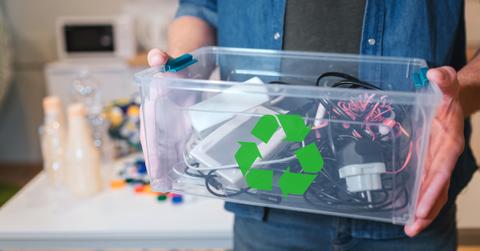How to Recycle Old Electronics, No Matter the Condition
There are plenty of options for giving your old technology new life.
Updated April 6 2023, 2:02 p.m. ET

Whether it’s a fax machine, TV, or blender, getting a new appliance or device is always exciting — but the device that once brought you joy might now sit quietly in a desk drawer; a broken toaster oven could be collecting dust in the garage; and about seven tangled pairs of airplane headphones are probably taking up space in your desk. The sensible thing to do would be to Marie Kondo your life — but if you’re trying to live sustainably, there are many ways to recycle electronics and technology.
READ NEXT: How Corporate Greenwashing Is Holding Earth Day Back
Luckily, there are plenty of places that offer free electronic recycling, and accept electronics as donations. Just as important as being a conscious consumer is being responsible when getting rid of possessions — and that's especially important when it comes to electronics, considering the facts that e-waste makes up 2 percent of the trash in U.S. landfills and only 12.5 percent of e-waste gets recycled.
So read on for all the easiest and most responsible ways to recycle every possible electronic item you have sitting around your house.
How to dispose of old electronics:
The first question to ask yourself is: Is this item still usable? Maybe that hand mixer works perfectly but you just haven’t baked in a decade; perhaps you’re moving or are looking to declutter, so that clunky printer just doesn’t serve a purpose anymore; or maybe you got a new laptop and your old one just isn’t needed. If you genuinely think someone would still use the item, consider selling or donating it before you recycle it. And an important note: make sure to always perform a factory reset on computers and tablets before recycling or donating them.
How to recycle old electronics:
If you have electronic items to recycle, your local Best Buy or Staples may be able to help. Both national chains have free electronic recycling programs at all of their U.S. stores (not including Staples’ smaller-format stores in NYC and D.C.). Many municipalities also offer occasional electronic recycling; and the recycling experts at TerraCycle offer some options as well.
Staples’ Free Electronic Recycling Program
Staples accepts any office device including: cameras, cables, laptops, phones, printers, shredders, fax machines, gaming consoles, GPS devices, flash drives, bluetooth speakers, tablets, mice, keyboards, or coffee machines.
You can bring items to Staples from any brand, in any condition — but before heading to your nearest location, check the store’s website or call them to make sure all of your items will be accepted. Staples limits customers to recycling seven items per day per person.
Best Buy’s Electronics and Appliances Recycling Program
Best Buy has an even more extensive recycling program, that includes electronic item you’d find in an office or around the house, aside from kitchen appliances. However, Best Buy’s program takes things a step further than Staples and accepts a few non-office appliances as well in any condition, such as vacuums, fans, curling irons, and hair dryers; Best Buy will even haul away TVs from your home or office and recycle them for a fee (only in certain states).
But according to Engadget, Best Buy now has a mail-in option that lets you order a small $23 box, or a $30 medium box for up to 15 pounds.
Local Electronic Recycling Options
Your town or city may hold recycling days for items that cannot typically be recycled curbside — so check your local municipality. Some local recycling centers accept technology and appliances for recycling.
Also, some cities allow certain appliances to be put in mixed recycling bins alongside bottles and cans. For example, New York City residents can put small appliances that are mostly metal or rigid plastic in their recycling bins, such as toasters, toaster ovens, blenders, and mixers.
TerraCycle’s E-waste Zero Waste Box
Private recycling company TerraCycle can recycle just about anything — so it’s no surprise that the company has an e-waste recycling program. You can purchase an E-waste cardboard box from the company and use it to collect all of your phones, cables, keyboards, radios, cameras, computers, turntables, stereos, etc. that you or your office needs to recycle. Once full, mail the box back to TerraCycle for recycling.
How to donate and sell old electronics:
If your items are still fully usable, consider donating or selling them. Websites like Craigslist, Facebook Marketplace, and Letgo are all great places to sell or give away an electronic item to someone who needs it, which will extend the life of the item. You can also look into Buy Nothing Facebook groups and Freecycle if you’d like to give the items away for free. You never know what tinkerers are out there!
If you don’t have any luck selling them item, consider dropping it off at your local thrift store — but make sure to ask the store manager what happens to donated appliances that do not sell. Unfortunately, some charity shops throw away items that have been on the shelves for several weeks with no sign of selling.
The three Rs of recycling go reduce, reuse, recycle — so do your best to only buy electronics that you need, use them until they are no longer usable, and when there’s no other option, take advantage of a recycling program. And to take your sustainable lifestyle to the next step, utilize some of the above resources when shopping for electronics — there’s no need to buy everything new when so many items in perfect condition can be found in thrift stores, on Craigslist, and even at official retailers.
This article has been updated.